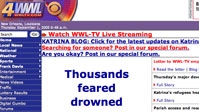Amid New Orleans disaster, locals turn to Internet for news
The professional video industry's #1 source for news, trends and product and tech information. Sign up below.
You are now subscribed
Your newsletter sign-up was successful

CBS station WWL-TV, owned by Belo Corp., stayed on the air throughout the first critical days of Hurricane Katrina. The station used a tower and transmitter at the company’s new facility in Gretna, LA, and also sent journalists to the communications center at Louisiana State University in Baton Rouge.
With the power down, their studios flooded, and few local viewers left to receive their signals, television broadcasters in New Orleans last week joined their print colleagues in moving to the Internet to deliver critical breaking news.
As a decentralized communications network, the Internet was more resilient than traditional media technology during the disastrous storm and its aftermath. In fact, aside from radio, it was the only form of electronic communications that worked well when Hurricane Katrina destroyed the city.
Only one of the four local television stations, WWL-TV Channel 4, a CBS affiliate, was able to stay on the air throughout the first critical days. Owned by the Belo Corp., the station used a tower and transmitter at the company’s new facility in Gretna, LA, and also sent journalists to the communications center at Louisiana State University in Baton Rouge, more than 75 miles away.
Two other stations, WNOL-TV Channel 38, a WB affiliate, and WGNO-TV Channel 26, an ABC affiliate, went off the air and relied on their Web sites, which featured weather updates, video footage and advice for coping with the disaster.
WDSU-TV Channel 6, an NBC affiliate, moved its operations to two sister stations, one in Jackson, MS, and another in Orlando, FL. With some interruptions, it got back on the air and presented news and weather programming on its Web site as well.
As the days wore on and the scope of the disaster began to be fully understood, network crews moved in, finding the logistics of New Orleans a nightmare.
The professional video industry's #1 source for news, trends and product and tech information. Sign up below.
Jack Womack, a CNN senior vice president, reflected the widespread view among news executives that the problems they faced last week in documenting the damage to the Gulf Coast have been far tougher than anything experienced covering the war in Iraq or the tsunami that hit Southeast Asia last December.
News organizations have scrambled against impediments like widespread power failures, disrupted cell phone service, and lack of fuel to maintain contact with correspondents and news crews, while also struggling to keep them supplied with food, water and shelter. There were reports that NBC News sent armed private security personnel — usually former soldiers or police — to the Gulf Coast region to protect its employees while covering the aftermath of the disaster.
